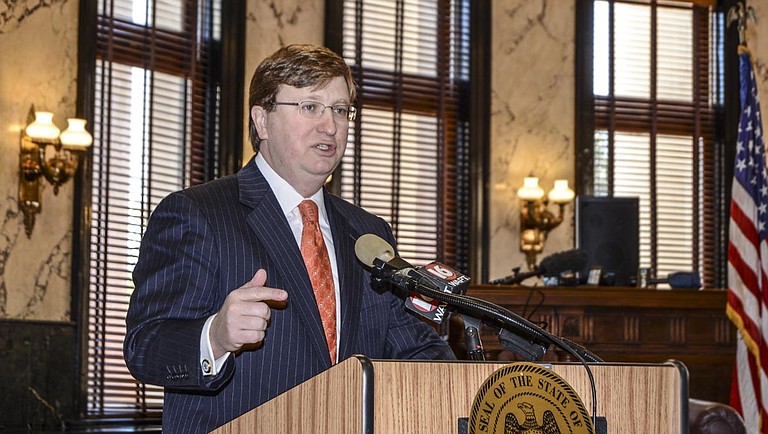In papers filed with the high court Friday, attorneys for Lt. Gov. Tate Reeves (pictured) and House Speaker Philip Gunn argued that a Hinds County circuit judge had no authority to rewrite the description for Initiative 42-A, which legislators put on the ballot as an alternative to a citizen-led proposal. Photo by Trip Burns.
Saturday, May 23, 2015
JACKSON, Miss. (AP)—Republican legislative leaders are asking the Mississippi Supreme Court to restore the original description for one of the two school funding amendments that will be on the ballot in November.
In papers filed with the high court Friday, attorneys for Lt. Gov. Tate Reeves and House Speaker Philip Gunn argued that a Hinds County circuit judge had no authority to rewrite the description for Initiative 42-A, which legislators put on the ballot as an alternative to a citizen-led proposal.
A ballot description for 42-A, written by Attorney General Jim Hood, said lawmakers must fund "effective free public schools."
After an Oxford parent filed a lawsuit that sought a different ballot title for the legislative alternative, Judge Winston Kidd rewrote the description to say the Legislature should fund effective schools but specified that people could not ask a judge to order legislators to follow a funding law.
Initiative 42 will be on the ballot because more than 100,000 people signed petitions to put it there. The ballot description of 42 says it would require "an adequate and efficient system of free public schools." People could sue if education funding falls short.
Adrian Shipman, the parent who supports the citizen-led initiative, filed the lawsuit over the 42-A ballot description. She said voters could become confused if the descriptions of the two proposals are similarly worded. The fight over what will appear on the ballot is important because the wording could determine whether voters accept one of the school funding proposals or reject them both. If one proposal is approved, it will affect how legislators set budgets for schools and other state services.
The Mississippi Adequate Education Program is a budget formula designed to give schools enough money to meet mid-level academic standards. Legislators have fully funded the formula only two years since it was put into law in 1997.
In their written arguments Friday, attorneys for Reeves and Gunn said state law does not give a circuit judge the power to rewrite the ballot description for an alternative initiative submitted by legislators. The attorneys, Michael Wallace and Charles Cowan, also wrote: "Because the circuit court's (ballot) title does not truthfully and impartially describe enforcement authority under our constitution, that title must be displaced and General Hood's title restored."
Attorneys for the sponsors of the citizen-led initiative have until June 1 to file their arguments with the Supreme Court, and justices will hear oral arguments June 9.
In a statement Friday, Shipman questioned why legislative leaders are spending time and effort on a court fight about the ballot description.
"If those legislators spent as much time and effort on improving public schools as they have fighting the parents of public-school students, maybe our children wouldn't be last in education," Shipman said.

Comments
Use the comment form below to begin a discussion about this content.
Sign in to comment
Or login with:
OpenID